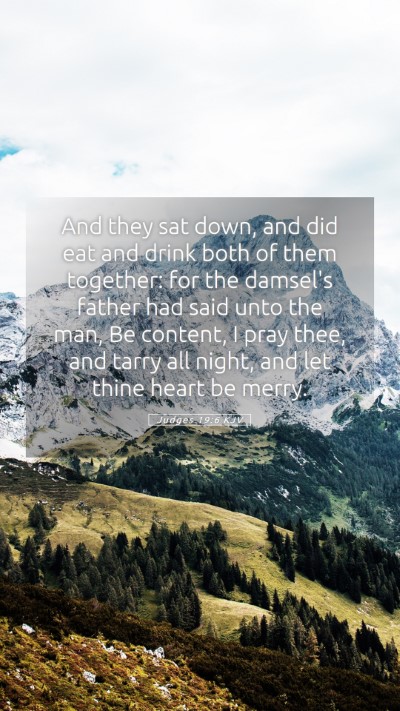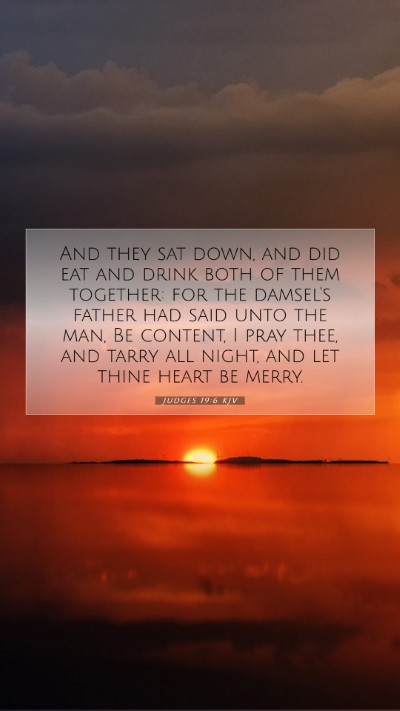Bible Verse Meaning and Interpretation: Judges 19:6
In the Book of Judges, Chapter 19, Verse 6 presents a narrative rich in social and moral implications. Understanding this verse requires a combination of careful scripture analysis, historical context, and insightful biblical exegesis.
Contextual Background
This chapter details the journey of a Levite and his concubine, highlighting the social decay in Israel during the period of the judges. The theme of hospitality, which is central in ancient Near Eastern cultures, plays a critical role in this verse.
Verse Explanation
Judges 19:6: “And they sat down, and did eat and drink both of them together: for the damsel's father had said unto the man, Be content, I pray thee, and tarry all night, and let thine heart be merry.”
- Hospitality and Community: The intentional invitation to stay reflects the cultural values surrounding hospitality. The father’s plea for the Levite to remain overnight shows the importance of community connection and kindness.
- Interpersonal Relationships: The dynamics between the Levite and the father-in-law indicate a relationship built on mutual respect and obligation, illustrating the ancient customs regarding family and marital ties.
- Spiritual Reflection: Henry notes that enjoying a meal together is symbolic of peace and fellowship. Here, it is essential to observe the spiritual significance of shared meals in promoting unity and joy.
Commentary Insights
According to Matthew Henry, this passage serves as a reflection on the decline of social morals in Israel. He emphasizes that the Levite’s willingness to indulge in the comfort offered by the father also raises questions about his leadership and moral integrity.
Albert Barnes adds that the phrase “let thine heart be merry” is an invitation to enjoy the moment—a contrast to the impending tragedy that unfolds later in the chapter. This juxtaposition invites readers to reflect on the fleeting nature of joy amidst societal decay.
Adam Clarke points out the implications of the Levite’s decision to accept hospitality. He writes that while the Levite initially appears to be the one in control, the hospitality offered ultimately leads to unforeseen consequences, showcasing a deeper commentary on the unpredictability of human relationships.
Interpretative Themes
- Earthly vs. Spiritual Joy: The invitation to merry-making contrasts with the serious undertones of the narrative, inviting analysis on the nature of true fulfillment beyond transient pleasures.
- Role of Women: The concubine's role in this narrative highlights the societal attitudes toward women during this time, inviting discussions on gender relationships in biblical texts.
- Moral Relativism: The setting of the story is a poignant commentary on the moral landscape of the time, encouraging readers to consider the relationship between societal norms and religious values.
Cross References
- Genesis 18:1-5: The importance of hospitality in biblical culture.
- Luke 10:38-42: The significance of welcoming guests as a reflection of one’s character.
- Judges 17:6: A parallel to the theme of Israel's lack of moral direction.
Bible Study Resources
For those seeking deeper insights into Bible verse meanings, consider utilizing resources such as:
- Bible study guides for thematic explorations.
- Online Bible study courses that focus on historical context.
- Bible study tools for cross-referencing and comparative analysis.
Conclusion
This verse serves as a significant point of reflection for understanding the complexities of human interaction within a biblical framework. Engaging with this scripture provides valuable Bible study insights that can enrich one's spiritual journey.


